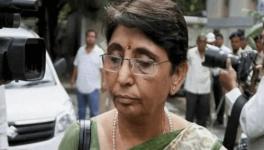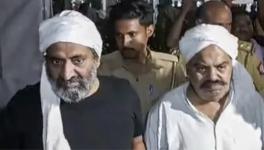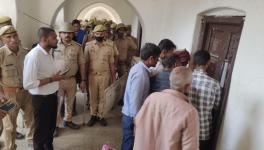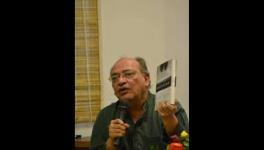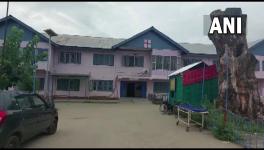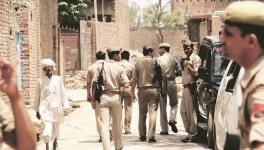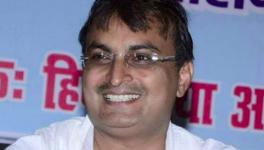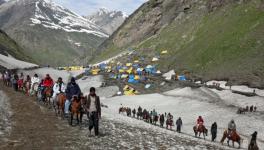Former Top Cops Say Recent Events Signal Collapse of Criminal Justice
File Image
The recent gunning down of gangster Atiq Ahmed and his brother Ashraf, and the acquittal of all 68 accused in the 2002 Naroda Gam massacre in which 11 Muslims died during the communal riots that engulfed Gujarat in 2002, reflect a complete breakdown of the criminal justice system. This was the unanimous view of several former senior police officers who believe the conclusions of the Supreme Court-appointed Special Investigation Team in the Naroda Gam case and the killings of the don and his family members indicate a serious and law-and-order crisis.
Retired Inspector-General of Uttar Pradesh Police SR Darapuri, the national spokesperson of the All India People’s Front, who was jailed for protesting against the Citizenship Amendment Act 2019, has accused Uttar Pradesh’s Yogi Adiyanath-led government of completely communalising the State police. “It is not that encounters did not occur in the past, but after 2017, they seem to have become part of State policy with over 10,900 encounters, resulting in the death of 183 people. Many were maimed, and while they and their families have turned to the National Human Rights Commission for relief, they have received little help from this [quasi-]judicial body.”
The NHRC is hugely understaffed and has around ten police officials to investigate complaints nationwide. “Unable to handle the volume, it sends complaints back to the State Human Rights Commissions, which have become practically defunct organisations,” says Darapuri.
Darapuri does not say Atiq Ahmed’s death was a stage-managed encounter but believes “the police allowed it to happen”. This is because, he says, there is no requirement for a “prisoner to get a health check-up done in a hospital at such a late hour”. He says it is a failure of the State to protect a prisoner who faced a high threat level and that the criminal justice system has been “hijacked”. “His killing, I must add, has made no difference to the dons operating in Uttar Pradesh who continue to flourish. The Hindu-Thakur ‘dons’ have aligned with the powers that be and have political protection—the Muslim dons are not safe,” Darapuri claims.
In the context of the Naroda Patiya massacre, Darapuri says the prosecution is bound to fail if a State openly favours the culprits. An SIT, a body ‘outside’ the police organisation, may be set up to investigate a crime. However, it is the prosecution that follows up on its findings. If it does not produce timely witnesses or provide them with security, witnesses feel insecure, back out, don’t depose properly or are unwilling to corroborate their earlier statements. “The sole objective of the State is to save the accused. It has become partisan and one-sided. This is what I believe happened in the Naroda Patiya case. I believe no one can get justice in Gujarat today,” he says.
Making matters worse is that the public has lost faith in the judiciary and police. That is why people are demanding instant justice—especially since extra-judicial killings are being shown as achievements of the State. And, once the rule of law is destroyed, no one can save those who oppose the State. “After Gujarat, Uttar Pradesh has become the Hindutva laboratory—encounters, eliminations, and bulldozers are manifestations of this trend,” says Darapuri.
At the same time, laws are becoming extremely stringent. Take the Epidemic Diseases Act 1897, under which the British rules of the day would jail people for a few days and make them pay a hundred-rupee fine—now this law entails a five lakh rupee fine and a seven-year jail sentence.
Retired former Uttar Pradesh Police officer Vibhuti Narain Rai, who exposed the custodial killings on 22 May 1987 in Hashimpura, says the story is being repeated with the ‘thok-do—kill them’ policy and his recent statement in the State Assembly that the “mafia” would be turned to “dust”.
Such statements bring Uttar Pradesh Police under pressure, encouraging officials to short-circuit the rule of law. Rai agreed with Darapuri’s remark that encounters did occur during his tenure, but they were not so brazen, and the police did not reflect communal prejudice. “Today, Uttar Pradesh Police has become completely brutalised,” he says.
Unhappy with these goings-on, Rai says, “Extra-judicial killings will prove disastrous for society. The poison has spread so widely that I cannot understand how our system will change. While politicians do this for mileage, the police have become slaves of their political masters.”
Meeran Chadha Borwankar, who was Maharashtra’s first woman Director General of Police, is also highly critical of recent developments. Commenting on the SIT freeing all the accused in the Naroda Patiya massacre, she says, “As a professional police officer, I feel sad we failed to put up a strong case... After all, who is responsible for the killings in Gujarat? Accused and murderers going scot-free is as dangerous for society as the innocent being wrongly held. Either way, it shows a collapse of the criminal justice system.”
She says, “Unconstitutional methods are resorted to only when constitutional methods fail. I’d rather ensure prompt criminal convictions within a year of a serious crime. Long delays in trials and very poor conviction rates for hardened criminals make citizens applaud police encounters.”
The National Crime Records Bureau data for 2021 says only 42% of criminals charged with serious offences were convicted. For democracy and a healthy society, it is better to invest in efficient police and judiciary than to depend on encounters. “Let us not be a banana republic—let us build public opinion in favour of the rule of law,” says Borwankar, who says Atiq and his brother’s killings in police custody were a clear case of police failure. She wonders why intelligence inputs about threats to their lives were not taken seriously. “They had earned the enmity of thousands through their criminal activities—let us await the judicial enquiry now instituted to conclude,” says she.
The problem is that Uttar Pradesh has made police encounters a part of State policy.
Several cops have said those killed or maimed in these encounters show the majority are minorities, Dalits or backward groups. Darapuri has sought from the State government the names and family details of all killed and disabled in this manner, along with details of the police officers injured and killed and the nature of their injuries. “Many policemen get themselves admitted to a hospital in the morning only to be discharged by the afternoon to make an encounter seem graver,” he reminds.
According to retired Inspector General of Police Kiran Bedi, encounters reflect a breakdown of the criminal justice system and all its arms, from prosecution to prisons, need reform. Delayed trials are one of the main reasons why criminals have flourished. The urgent need for prison reforms is best manifested in how Atiq and Ashraf were brought to a Lucknow hospital late at night. Bedi believes telemedicine for at-risk prisoners could have easily resolved the problem of a health check-up without moving them from the prison.
According to Dr Amitabh Thakur, retired Uttar Pradesh IPS officer, recent happenings at the level of lower judiciary signal an immediate need to introspect.
“There is a strong feeling that the judiciary is no longer isolated and can fall prey to external circumstances,” he says, adding, “I think people in power have succeeded in dividing people. Those who support the current dispensation are happy with what is happening. They believe justice is now being done whereas, earlier, injustice was being done. Those who think objectively are highly disturbed, but they have become so inconsequential their viewpoints are ignored,” Thakur says.
The political party in power is numerically and financially strong, and the media and other institutions of power are also under its control. Those with contrary points of view feel completely helpless. “I think the situation will drastically change,” says Thakur, adding, “History has shown that it may appear things are in favour of those in power, but situations can change—suddenly and rapidly,” Thakur says.
It does appear as though the State has abdicated its duty to protect a large section of society. The body language and words of those in power are crucial signals to the police and bureaucracy. When important political functionaries unhesitatingly make highly provocative statements to deepen the communal divide, it does not portend well for the country.
The author is an independent journalist. The views are personal.
Get the latest reports & analysis with people's perspective on Protests, movements & deep analytical videos, discussions of the current affairs in your Telegram app. Subscribe to NewsClick's Telegram channel & get Real-Time updates on stories, as they get published on our website.









